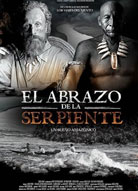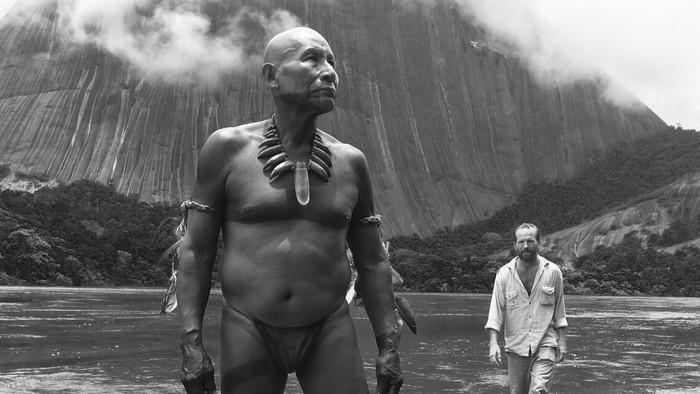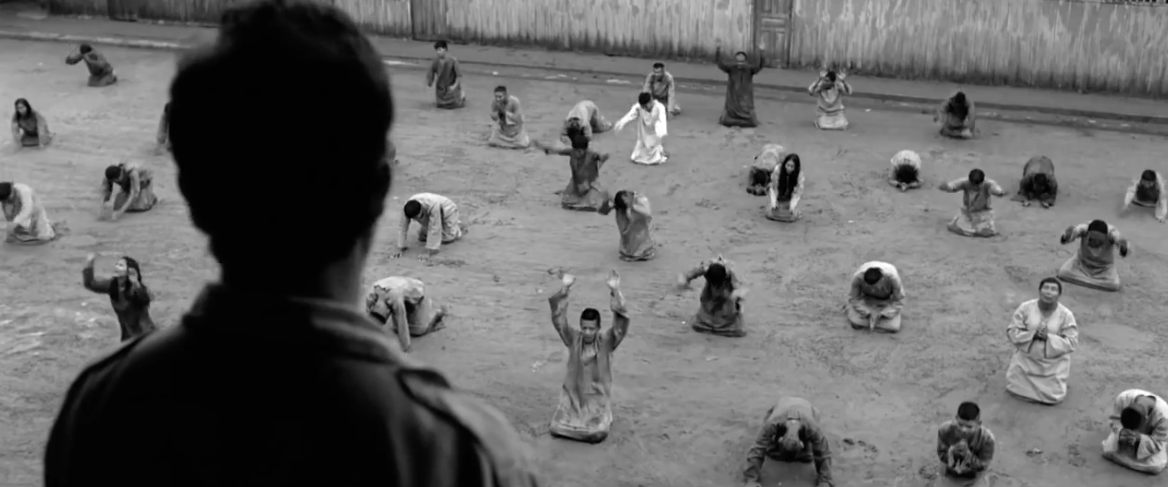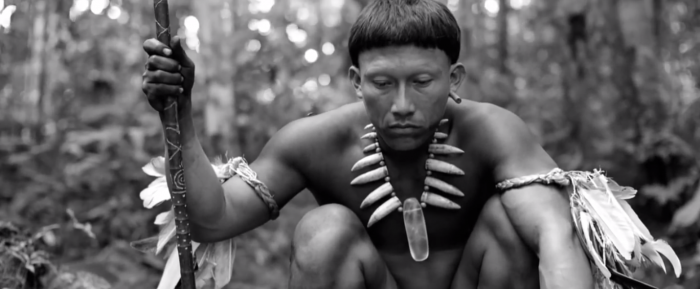 Embrace of the Serpent, Colombia's great Foreign Language Film Oscar nominee took so long to arrive in theaters it may have well have arrived by rickety wooden boat after its grueling journey on the Amazon. But it's finally in theaters in select cities and just in time for the Oscars. Do NOT miss it.
Embrace of the Serpent, Colombia's great Foreign Language Film Oscar nominee took so long to arrive in theaters it may have well have arrived by rickety wooden boat after its grueling journey on the Amazon. But it's finally in theaters in select cities and just in time for the Oscars. Do NOT miss it.
I had the pleasure of speaking with the director Ciro Guerra about this cinematic triumph ... which I'm guessing was harder to make than The Revenant.
NATHANIEL: This is an extremely ambitious effort for a filmmaker as new as yourself. It's only your third film. How long have you been working on this?
CIRO GUERRA: I worked on it for about four years before we started shooting. I had done just two very personal films that were close to my experience, and my past, and my culture. So I wanted to go the opposite way, and take a journey into the unknown.
NATHANIEL: You did. It's hypnotically strange.
CIRO GUERRA: For us Colombians, the Amazon is the most unknown thing. It’s half of the country, but clearly we don’t know much about it. So, I had always been intrigued and fascinated and it had been a lifelong dream to do a film in the Amazon, and you know, these are the kind of films you can only do while you’re young. [More...]

[Laughs] I suppose that’s true.
I felt like I was three years old again. I came across the diaries of the explorer and there was a story there that hadn’t been told before.
You co-wrote this with Jacque Toulemonde? Did you present it to him or...?
I worked on the script for about two and a half years. It was such a complex script with so many possibilities that at one point I just became lost. Getting into the Amazonian frame of mind was so demanding. I needed a new perspective. Jacques, who’s a close friend of mine, came on board and he felt how to bring it to the final version. The final draft we worked on together, so we managed to make a film that was both Amazonian and relatable to an audience that had come from some other place.
This is the first film of yours that I’ve seen, and I was amazed. But reading about your past work it seems all of your films have this element of a mentor relationship or two strangers learning from each other.
The films that I’ve made are quite different from each other on the outside, the superficial aspects, but deep down they have a strong undercurrent that binds them together.
Did you have, with this particular project, films you wanted to recall or films that influenced you?
I’m a big fan of cinema, and I watch a lot of films, and I have great respect for the tradition of the masters, but this film could not be about cinema. This film had to be about life, the thirst from the eyes of the explorer, and especially the photographs. From there it was just getting to know these people of the Amazon, and understanding the way that they live together and their understanding of the world.
The most shocking part of the film is when you return to the same far away place and realize how this perverse form of Christianity has evolved. This was fascinating but Christians can be very touchy about portrayals of Christianity. Have you had any push back on this?

I haven’t gotten much feedback but what I have heard that we shouldn’t be telling it because the past is the past! The Pope actually apologized for this kind of abuse that you see in the film. The craziest sequence in the film, which is the messiah sequence, is the one sequence that really, really happened. It really happened on the border of Colombia and Brazil, This man proclaimed himself to be the Messiah, and he had 2000 followers. What you see in the film is only barely – it was much crazier in real life. It’s the kind of thing where reality becomes fiction.
After I first saw the film I was urging people to see it on the biggest screen possible. When you’re working on something like this, I assume you’re on a computer editing and what not. Is there a moment where you realized how much of an achievement this film was visually?
For me, personally, the achievement was to finish the shooting! There were so many moments where this was not going to be possible. Just being able to make it and finish it, and being able to live the experience of making it, is the award. Everything else is icing on the cake.
You just spend so much time working on a film, and it’s such a personal project, that when it comes out, you have absolutely no idea of what it is. You just hope that it’s true and that someone else will be able to understand and communicate with it. It's like when you put a message in a bottle. You throw it in the sea and you never know if somebody’s going to pick it up and someone’s going to understand it or if it’s going to be forgotten.
Your cinematographer, David Gallego, he’s fairly new, right?
This is only his third film, but he’s young, he knows the camera processes, and he’s so adventurous. I have to tell you, I’ve never seen anyone work so hard on a movie. He was just unstoppable, even when there were times when I felt so tired. He lives in this film so much; he gave it its soul.
That's high praise. And what a calling card for a cinematographer. For those of us who aren't familiar with Colombian cinema, was it a surprise to you to represent Colombia for the Oscars?
It was a very strong year for Colombian cinema, possibly the strongest in history with three Colombian films at Cannes and festivals like Berlinale and Toronto. There were five or six films that could have been chosen and for us it was a great honor.
Had you seen your Colombian competition?
Yes. I try to see as much as cinema from Colombia as I can, but it’s not healthy to think of cinema as a competition.

So maybe you’re of two minds with this Oscar race then! [Laughs] Like it’s an honor but you don’t see it as a contest.
For me, it’s an opportunity for people around the world to discover films that they probably would not hear about. And when you make film, you want to be seen by an audience as large as possible. If this is part of the process of getting the film seen, I'm there.
 Since you didn’t think this film was ever gonna be finished originally, are you taking a break now. This is going to be hard to follow up, no pressure!
Since you didn’t think this film was ever gonna be finished originally, are you taking a break now. This is going to be hard to follow up, no pressure!
I’m already working on my next film, which is going to be a completely different, but also set in Colombia. This time it's in the Wajito Desert. I just tell the stories that resonate with me, and don't worry if it’s going to be a success or not. Every movie teaches me a lot, both the experience of making it and the experience of sharing it. I just learn from it and move on.
